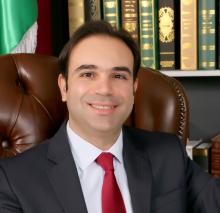You are here
When does the economist make a difference?
May 10,2025 - Last updated at May 10,2025
Economics is not just a set of theories or numbers. It is a complex science that deals with a changing and often difficult reality. At its heart, economics is about using limited resources in the best way to increase benefit, profit, or social well-being and reduce all types of losses.
But who can actually make this happen? Is it the person who studies economics, or the one who applies it in the real world? The answer is: the professional economist.
A professional economist combines strong academic knowledge with the skill to apply that knowledge in real situations. They understand the current economic situation, identify where it should go, and offer realistic solutions. These solutions are based on clear thinking, numbers, and a full understanding of how the economy works.
At universities like the University of Jordan, which offers high quality degrees in economics (bachelor’s, master’s, and doctorate) students learn economics through logic, models, and mathematics. This is very important for building a good economist. But real world work needs more than theory. It needs critical thinking, a strong grasp of reality, and the ability to connect small details to the bigger picture. That’s why academic programs have been improved to match what the job market needs and to prepare students with practical skills.
The professional economist starts by analyzing the economy in depth using numbers and data. They first define the actual economy—the current situation. Then, they compare it to the potential economy—what can really be achieved with the country’s resources. This comparison is key to their work. If the economy is improving, the economist works to keep the momentum going. If it’s slowing down, they suggest new plans to bring it back on track and reduce any damage.
This type of work needs analysis on many levels: at the national level (macro), and at the level of businesses and individuals (micro). It also needs a clear understanding of the local situation—politics, society, and culture. Economics doesn’t happen in a bubble. It’s part of a bigger system.
In countries with big challenges like Jordan, applying theories isn’t easy. How can the classical model—which says the market will fix itself—or the Keynesian model—which says the government must step in—really work with problems like high debt, energy costs, low wages, and weak social protection? These models need to be adapted to fit real life challenges.
That’s the difference between someone who only studies theories and someone who applies them in real life.
So, when do people feel the effects of economic decisions? The answer isn’t simple. People notice results when policies turn into real improvements—better income, stable prices, or new jobs. That doesn’t happen by chance. It happens when decisions are made and carried out by professionals who understand what they’re doing. That is the true role of the professional economist—someone who uses economics to make a real difference, not just to study it.
Raad Mahmoud Al-Tal is head of the Economics Department – The University of Jordan- r.tal@ju.edu.jo













Add new comment